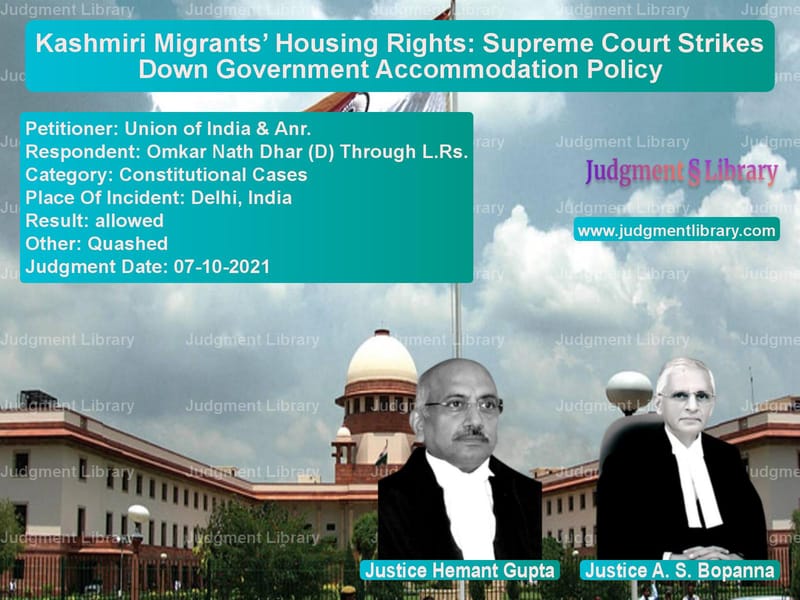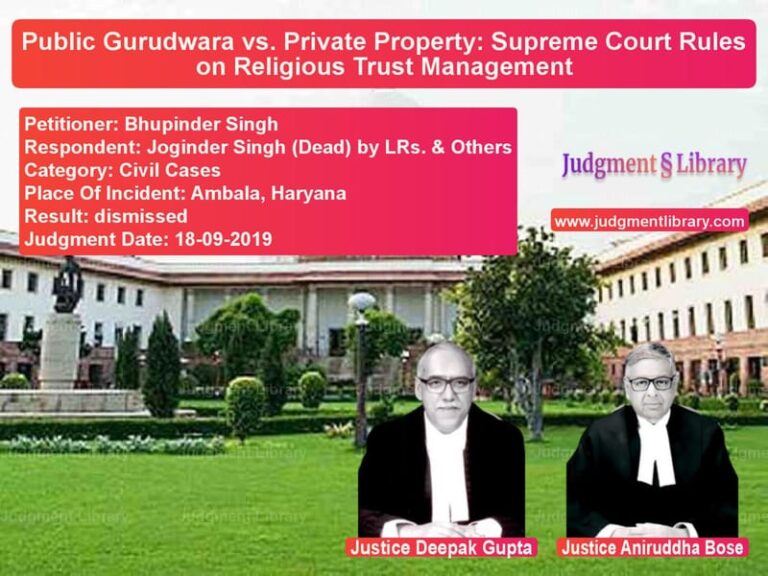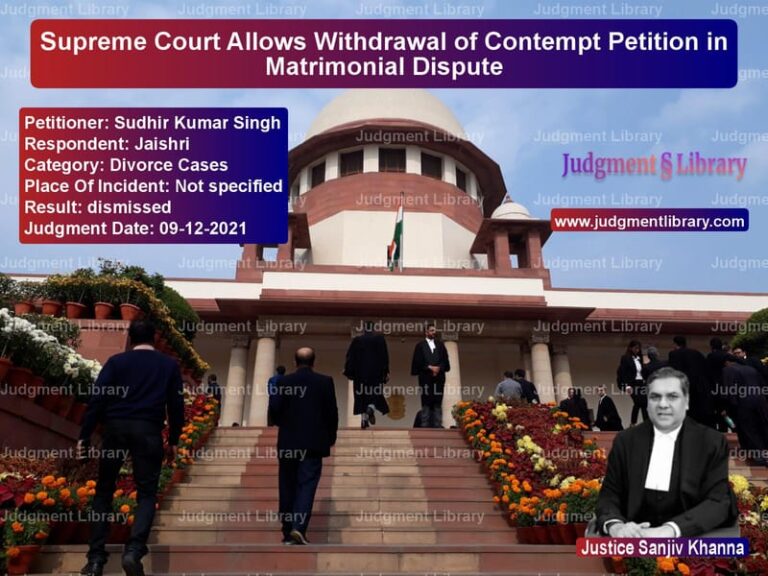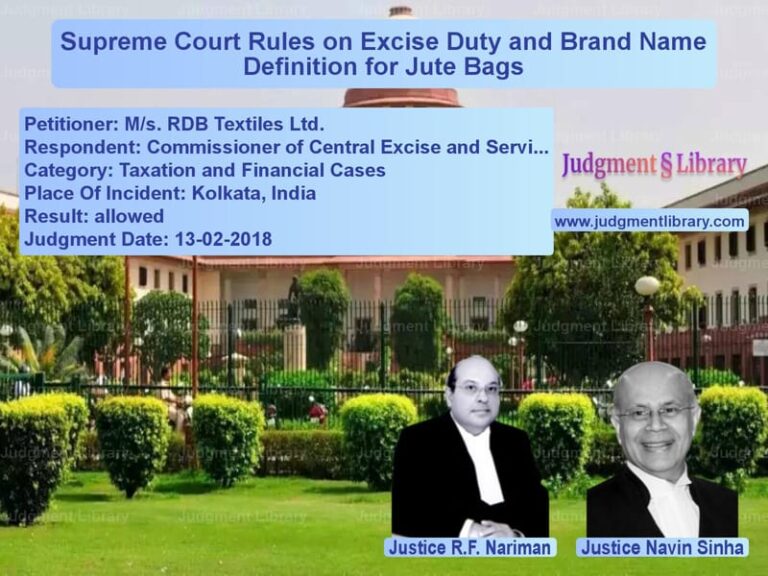Kashmiri Migrants’ Housing Rights: Supreme Court Strikes Down Government Accommodation Policy
The Supreme Court of India, in Union of India & Anr. vs. Omkar Nath Dhar (D) Through L.Rs., ruled on the legality of providing government accommodation to retired Kashmiri migrants who were former central government employees. The Court struck down an Office Memorandum that allowed these individuals to retain government residences indefinitely, holding that such a policy violated the principle of equal treatment under Article 14 of the Constitution. This judgment significantly impacts government housing policies and the rehabilitation framework for Kashmiri migrants.
Background of the Case
The case originated from a policy formulated in compliance with a Delhi High Court order in Union of India v. Vijay Mam. The policy, issued through an Office Memorandum dated March 28, 2017, provided continued accommodation in government quarters for retired central government employees who had been displaced from Jammu and Kashmir due to terrorism. The policy was further modified on May 19, 2017, to include all Kashmiri migrants holding General Pool Residential Accommodation (GPRA) in Delhi, irrespective of whether they were litigants before the Delhi High Court.
The Union of India challenged this policy, arguing that it led to unfair occupation of government residences, preventing their allocation to serving government employees.
Legal Issues
The key issues before the Supreme Court were:
- Whether the government’s policy allowing retired Kashmiri migrants to indefinitely retain government accommodation was legally valid.
- Whether the policy violated Article 14 (Right to Equality) by creating special privileges for a specific group of retirees.
- Whether the government’s need to house serving officials outweighed the claims of displaced Kashmiri migrants.
Arguments Presented
Petitioner’s (Union of India) Arguments:
- Government accommodations are meant for serving officers and cannot be occupied indefinitely by retired employees.
- Allowing Kashmiri migrant retirees to stay in government housing beyond their retirement unfairly disadvantaged serving officials waiting for accommodation.
- The government had already provided multiple rehabilitation benefits to Kashmiri migrants, including jobs, financial assistance, and transit housing.
- The Parliament had been informed that around 3,800 Kashmiri migrants had been successfully rehabilitated post-abrogation of Article 370.
Respondent’s (Kashmiri Migrants) Arguments:
- Kashmiri migrants form a unique class as victims of terrorism and displacement.
- The policy was formulated in response to a Delhi High Court ruling that acknowledged their need for continued housing support.
- Unlike other retired government employees, Kashmiri migrants had no permanent homes to return to due to the conditions in Jammu and Kashmir.
- Many migrants had served in sensitive intelligence positions and needed additional security and housing stability.
Supreme Court’s Ruling
The Supreme Court ruled in favor of the Union of India, striking down the policy that allowed retired Kashmiri migrants to indefinitely occupy government accommodation.
On Government Housing Policy:
The Court held that government housing is meant for serving employees and cannot be used as a permanent settlement scheme for retirees. The ruling emphasized:
“Government accommodation is not a right but a privilege granted to serving employees. Extending this benefit indefinitely to retirees, even for humanitarian reasons, is discriminatory and violates Article 14.”
On Equal Treatment Under Article 14:
The Court rejected the argument that Kashmiri migrants deserved indefinite housing benefits, stating:
“There cannot be any justification on the basis of social or economic criteria to allow Kashmiri migrants to stay in government accommodation indefinitely. Such classification is arbitrary.”
On Alternative Rehabilitation Measures:
The Court noted that multiple rehabilitation schemes were in place for Kashmiri migrants, including:
- Financial assistance for housing repairs and construction.
- Cash relief up to Rs. 13,000 per family.
- Employment packages for over 3,800 migrants.
- 6,000 transit accommodation units under construction.
The Court held that these measures were sufficient and that indefinite retention of government quarters was unnecessary.
On the Three-Year Cooling Off Period:
The Court provided a transition period for affected individuals:
“Retired Kashmiri migrant employees shall be allowed to retain their government accommodation for three years from the date of retirement. Beyond this period, they must either vacate the premises or shift to transit accommodation.”
Impact of the Judgment
The ruling has significant implications:
- Government housing vacancies will increase, benefiting serving employees who need accommodations.
- Kashmiri migrants will need to transition to alternative housing arrangements within three years of retirement.
- Future policies will need to be balanced between rehabilitation efforts and equitable treatment of government employees.
- The judgment reinforces the principle that government housing is a temporary privilege, not a lifelong entitlement.
Conclusion
The Supreme Court’s decision in this case establishes a critical precedent on government housing policies. It ensures that serving officials are given priority for government accommodations while acknowledging the unique circumstances of Kashmiri migrants. By setting a three-year transition period, the Court provides a balanced approach, allowing affected individuals time to make alternative housing arrangements. This ruling reinforces the broader principle that government resources must be distributed equitably and in accordance with constitutional mandates.
Petitioner Name: Union of India & Anr..Respondent Name: Omkar Nath Dhar (D) Through L.Rs..Judgment By: Justice Hemant Gupta, Justice A. S. Bopanna.Place Of Incident: Delhi, India.Judgment Date: 07-10-2021.
Don’t miss out on the full details! Download the complete judgment in PDF format below and gain valuable insights instantly!
Download Judgment: union-of-india-&-anr-vs-omkar-nath-dhar-(d)-supreme-court-of-india-judgment-dated-07-10-2021.pdf
Directly Download Judgment: Directly download this Judgment
See all petitions in Fundamental Rights
See all petitions in Public Interest Litigation
See all petitions in Separation of Powers
See all petitions in Judgment by Hemant Gupta
See all petitions in Judgment by A. S. Bopanna
See all petitions in allowed
See all petitions in Quashed
See all petitions in supreme court of India judgments October 2021
See all petitions in 2021 judgments
See all posts in Constitutional Cases Category
See all allowed petitions in Constitutional Cases Category
See all Dismissed petitions in Constitutional Cases Category
See all partially allowed petitions in Constitutional Cases Category







